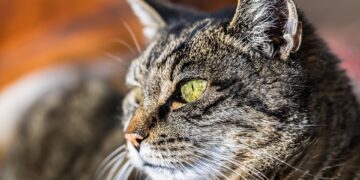The Kitty Conundrum: Understanding Cat Behavior Changes Post-Vaccination
As responsible pet owners, we understand the importance of vaccinating our furry friends to protect them from various diseases. However, have you ever noticed changes in your cat’s behavior after they receive their vaccinations? In this article, we will delve into the common cat behavior changes post-vaccination and provide insights on how to address them.
What to Expect After Vaccination
It is normal for cats to exhibit some changes in behavior after receiving vaccinations. This can include lethargy, loss of appetite, and mild fever. These symptoms usually subside within a day or two, but it is essential to monitor your cat’s condition closely.
Common Cat Behavior Changes Post-Vaccination
Lethargy
One of the most common behavior changes in cats post-vaccination is lethargy. Your cat may seem more tired than usual and may not have the same level of energy as before. This is a normal response to the vaccine and should improve within a day or two.
Loss of Appetite
Some cats may experience a loss of appetite after receiving vaccinations. This can be concerning for pet owners, but it is essential to give your cat some time to recover. If your cat continues to refuse food for more than 24 hours, consult your veterinarian.
Mild Fever
A mild fever is another common symptom after vaccination. Your cat may feel warm to the touch and may be more subdued than usual. Make sure to provide your cat with a comfortable and quiet space to rest and monitor their temperature regularly.
How to Help Your Cat
There are several ways you can help your cat cope with the behavior changes post-vaccination:
Provide Comfort
Make sure your cat has a comfortable and quiet place to rest after receiving vaccinations. Provide soft bedding, a warm blanket, and some familiar toys to help them feel secure.
Monitor Their Condition
Keep a close eye on your cat’s behavior and symptoms after vaccination. If you notice any concerning changes or if your cat’s condition does not improve within a day or two, contact your veterinarian for advice.
Offer Plenty of Water
Encourage your cat to drink plenty of water to stay hydrated. Dehydration can worsen the symptoms of lethargy and fever, so it is essential to keep your cat well-hydrated.
When to Seek Veterinary Care
While most cats recover from the behavior changes post-vaccination on their own, there are instances where veterinary care may be necessary. If your cat exhibits any of the following symptoms, contact your veterinarian immediately:
- Persistent loss of appetite for more than 24 hours
- High fever (over 104 degrees Fahrenheit)
- Severe lethargy or weakness
- Difficulty breathing or wheezing
Conclusion
Understanding cat behavior changes post-vaccination is essential for pet owners to provide the necessary care and support for their furry friends. By recognizing the common symptoms and knowing when to seek veterinary care, you can help your cat recover quickly and comfortably. Remember to always consult your veterinarian if you have any concerns about your cat’s health and well-being.
By following these tips and being proactive in monitoring your cat’s condition, you can ensure a smooth recovery process and keep your furry friend happy and healthy.











































